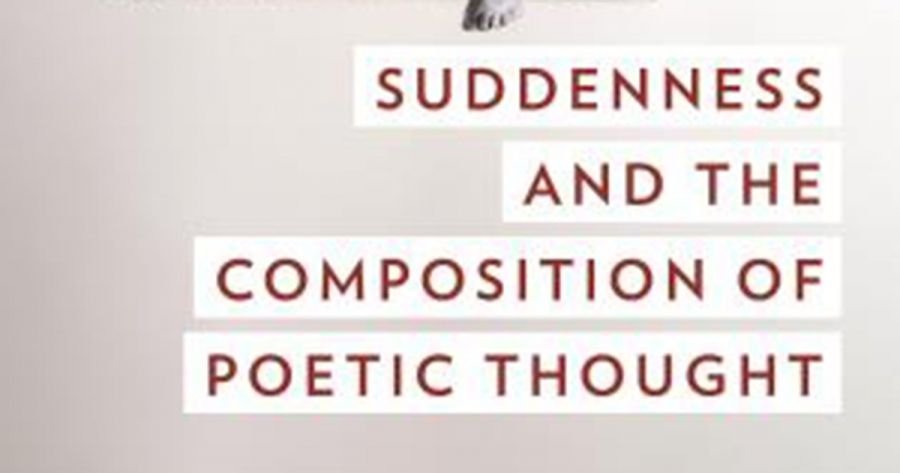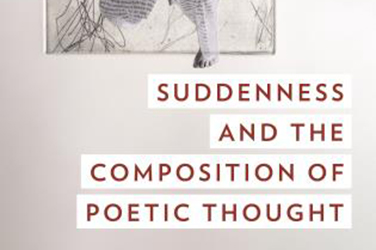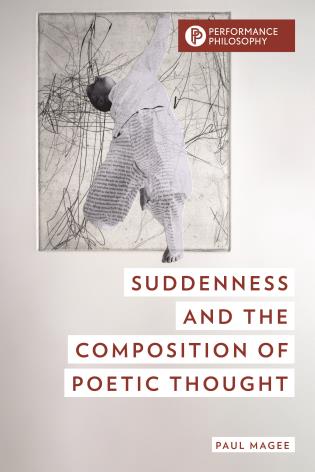
- Free Article: No
- Contents Category: Literary Studies
- Review Article: Yes
- Article Title: The will to suddenness
- Article Subtitle: An arresting book on the poetic process
- Online Only: No
- Custom Highlight Text:
When I sit down to write this review on a snowy morning during a ten-day trip to upstate New York, are the words I write pre-planned, is the shape of this piece clear in my head, or is it all coming to me as I place my fingers on the keyboard and grapple with the symbols appearing on the screen? Are the words you are reading at this moment the words that I originally wrote on a Northern Hemisphere winter’s morning, or have they been revised, rethought, planned anew.
- Featured Image (400px * 250px):

- Alt Tag (Featured Image): Patrick Flanery reviews 'Suddenness and the Composition of Poetic Thought' by Paul Magee
- Book 1 Title: Suddenness and the Composition of Poetic Thought
- Book 1 Biblio: Rowman & Littlefield, US$115 hb, 264 pp
- Book 1 Cover Small (400 x 600):

- Book 1 Cover (800 x 1200):

This is a provocative book in the best possible sense, because it demands that the reader (particularly the reader who is also a writer) reconsider their practice and its relation to thought, speech, and planning. Magee mounts a complex and interlocking argument that takes us on a journey across the contemporary moment, hurls us back to Ancient Greece, and alights in the territories of Romantic poetry (‘Keats was not just fast, he was accurate’), cognitive literary criticism, meditations on the relations among speech, thought, and writing, and delivers us in the end to a place and time of transformation. To agree is to inhabit a position of accord, to disagree to be remade by the encounter with an argument that nonetheless marks one’s own thought and knowledge, and, in this case, one’s practice as a writer, perhaps in an enduring way.
I have no reason to doubt Magee’s assertion that ‘[w]e lack the cognitive capacity to see clearly in our mind the exact wording of what we are about to say, in advance of the two or three seconds in which we come to say it.’ Nonetheless, I found myself both astonished by this information and moved to reflect intently on my sense of the way thought and speech interact for me – how they either perform or resist – in different contexts. That marking of human cognitive limitation in relation to speech is, Magee says, ‘what I am calling suddenness. It is the condition of all acts of speaking, and a key factor in the shapes our writing takes as well.’
Perhaps my surprise and resistance to the argument is informed by the sense that I do not think well in speech; my best thinking always takes place on the page. So to find Magee beginning with Heinrich von Kleist’s assertion that knowledge comes about through speech with another person, rather than meditation, provoked an immediate conviction that this was not true, at least not for me. Magee, in his careful way, acknowledges ‘the pejorative construction so regularly placed upon’ the ‘possibility of talking off the top of our heads’, but he goes on to champion Kleist’s ‘stark vision of unpremeditated speaking as a pre-eminent mode of intellectual and political inquiry’ and to frame it as the basis for the book’s argument that ‘Kleist was right in more ways than even he could know.’
Even as I found myself resisting Magee’s argument, or perhaps the way in which it is framed at certain points – acknowledging the importance of forethought and planning and revision even as a kind of Romantic attachment to suddenness (or epiphany) seems to take hold of Magee and some of his poet interlocutors – the substance of the interviews quoted throughout the book is reason enough to engage with what Magee senses to be true. Whether that is a general principle or a phenomenon characteristic of a certain tranche of contemporary poetry and thinking about poetics is the question that hovers around the periphery of the text.
Magee’s account of and quotations from the poets he and colleagues interviewed are undeniably fascinating. Midway through these conversations, he offers his interviewees a quote from W.H. Auden: ‘When we genuinely speak we do not have the words ready to do our bidding, we have to find them. And we do not know exactly what we are going to say until we have said it, and we say and hear something new that has never been said or heard before.’ Magee tells us that ‘close to a third of the poets’ he interviewed ‘rejected Auden’s words, often vehemently’. Though he offers arguments against Auden’s position by North American poets such as Rae Armantrout and C.D. Wright, Magee seems willing to be convinced by the proposition, perhaps moved by the numbers, or by the enthusiastic endorsement of someone like Don Paterson, who argues that a poem ‘is almost a documentary record of an epiphany that has taken place in the course of its own making’. Paterson goes so far as to insist that ‘[i]f you have a revelation a week before and then try to write it up, you are already lost. It will be a bad poem. If you have a good idea for a poem, it isn’t. You have to come to the page with nothing, an urge to speak – as Auden says – without really knowing why.’
I find this kind of position taking so frustrating that I am necessarily on the side of the third of poets who disagreed with Auden. Of course, it is perfectly fine if Paterson himself believes that this approach is the only way that works for him (or perhaps even for the poets he has edited), but it is by no means a universal rule of composition that forethought and planning produce inferior work – whether in poetry (the focus of Magee’s argument) or any other literary form. To Magee’s credit, he acknowledges the demurrals, such as from the late C.D. Wright, who said of Auden’s quotation: ‘It sounds like the hubris of someone painfully young who puts outsized stock in originality.’ (Like Armantrout, we might position Wright on the experimental end of the poetic spectrum.) For Wright, ‘much preparation’ had to be done to produce a sense of ‘spontaneity’; revision was central to her process, a point that Magee underscores by reporting how assiduously she revised the text of their interview as well as noting her growing ‘impatience with [Auden’s] quotation’.
What I wished for throughout Magee’s engagement with the poets he interviewed was a clearer acknowledgment that where writers place themselves in relation to particular traditions (avant-garde, language poetry, the lyric, prose poetry, the confessional, etc.) undoubtedly informs the mechanics of their practice, the way they conceptualise what they do and how they do it. Magee, however, asserts that ‘the various schools in which poets might be grouped’ did not ‘shed much light’ on how they responded to the Auden quotation (I wished for a more granular sense of what Magee meant by this). Moreover, I found it curious that his approach to substantiating his argument seems driven by a comparatively small data set (the seventy-five interviews), particularly when he recognises ‘very real problems with assuming poets’ self-reports will be at all accurate’. Instead, however, he questions ‘just how rigorous … scepticisms are’ about the reliability of poetic self-reflexivity. It seems worth registering that the poets who disagree with Auden, and implicitly with Magee’s argument about suddenness, are also the poets whose work I would most readily choose to spend time with. Taste and sensibility inform both the way one responds to Magee’s book and to the problem he frames.
As illuminating as his discussion of revision is in relation to the Romantics and to Ezra Pound’s effect on T.S. Eliot’s work, I felt myself doubting assertions like the following in relation to Eliot’s revision and completion of The Waste Land:
the brief crossing-out of an infelicitous phrase at the start of [a line] hints at the possibility that this pencilled page is where they first came to mind … The recoil from Pound’s terrific, accurate violence seems … to have involved Eliot writing fast and stunningly.
Yes, perhaps, but it is also possible to imagine a wholly different scenario: having seen Pound’s interventions, Eliot might have spent a period of time thinking, writing, and even revising in the mind (as some of us routinely do) before picking up pencil or sitting down to type. That Magee makes us ask these questions – even if one does not agree with the way he positions himself – is part of what makes this book as valuable as it is. That Magee suspects he himself would also respond negatively to the Auden quotation makes the book’s insistence on the primacy of ‘action’, ‘pace’, and ‘suddenness’ all the more curious, as if there is a kind of will to suddenness, a wish to believe in the creative power of writing-as-event. I would hope for a conception of the relations among temporality, pace, thought, speech, and writing that allowed for the idiosyncrasy of the individual mind, the outlier, the writer engaged in a dissident tradition. Magee’s arresting book offers us an intervention that invites return visits and further thinking at this time when human creativity, faced with machine-made texts, must demonstrate its radical singularity, its strangeness and wildness.


Comments powered by CComment